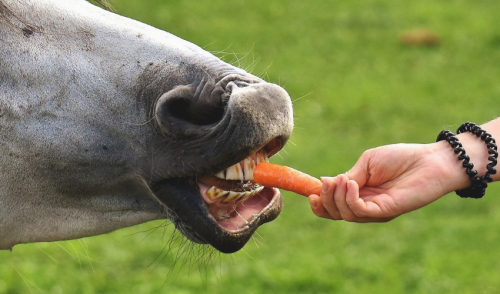{article.name}
Stay Informed
When Should I Have My Horse’s Teeth Floated?

- Share this:
- Share on Facebook
- Pin on Pinterest
- Tweet on Twitter
Dental care may not be the first thing on your mind when you are planning veterinary checkups for your horse, but a healthy mouth is essential for the animal’s comfort and well-being. A good schedule for proper teeth floating should be part of any equine wellness plan.
What Is Floating a Horse’s Teeth?
Floating a horse’s teeth is the process of gently filing away sharp edges or hooks to present a firm, flat surface for more efficient chewing. The small file or rasp used to do this is called a float, which gives the process its name. Floats can vary in shape from small rectangles or ovals to cylindrical shapes, and may have straight or bent heads to more easily and comfortably reach back teeth.
Floats may be manual or driven by electricity or an air compressor, and an experienced equine dentist will have a variety of tools to choose from to suit each animal’s needs and personality. Dental wedges or speculums may be used to hold the horse’s mouth open comfortably and reduce the risk of bites, and different halters, blindfolds, harnesses, or restraints may also be used if necessary. Some veterinarians may also choose to lightly sedate a horse before working on its teeth, if the animal’s personality could cause difficulties.
If properly done, floating should take no more than a few minutes unless the horse presents unique challenges in either dentistry or temperament. Because the teeth have no nerve endings, floating should cause no pain or discomfort to the animal unless there are other dental concerns, such as mouth injuries or gum disease that can lead to greater mouth sensitivity.
Why Floating Is Necessary
Horses must chew their food well for the best digestion. Food that is not ground up well will not be digested properly and nutrients will not be absorbed as efficiently, which could cause malnutrition, weight loss, or other health problems. Because a horse’s upper jaw is naturally wider than its lower jaw, teeth will wear unevenly, leaving sharp edges, ridges, or hooks against the cheek and tongue. This can cause cuts or sores to sensitive tissue, and those injuries can easily become infected, leading to greater health issues.
When to Have Your Horse’s Teeth Floated
If your horse’s teeth are in bad shape, the animal will show signs that floating may be needed, such as…
- Dropping food or general reluctance to eat
- Difficulty chewing or shifting food to one side of the mouth
- Bloody saliva or excessive mouth foaming
- Appetite loss or weight loss
- Swollen facial tissues, especially in the cheeks
- Foul breath
Even if your horse shows no signs that its teeth may need floating, it is important to have a dental exam at least once a year to check for any developing problems. Different factors can influence how frequently any horses’ teeth may need to be floated, including…
- General head and jaw proportions
- Age
- Diet
- Rate of tooth eruption
- Lost teeth or other dental problems that can affect how remaining teeth wear down
In general, younger horses less than five years old may need to have their teeth floated as frequently as every six months, since their teeth are erupting more quickly. From five years to 20 years, most horses only need their teeth floated once a year, and some animals may not need treatment even that frequently. Horses older than 20 years should be checked for dental problems every six months, but floating should only be done conservatively as there may not be much of the horse’s teeth left to erupt and replace what is worn away. Older horses may only need their teeth floated once every 2-3 years.
It is important, however, not to over-float your horse’s teeth. Too much filing can wear teeth out more quickly or cause loose or broken teeth. Gums and other mouth tissues could also be injured if floating is not done correctly. A reputable, experienced equine dentist will examine your horse’s mouth thoroughly before floating and will take proper care with the job to keep the animal’s teeth in excellent condition, no matter what floating schedule your horse may need.
Special Offers
We are constantly adding new specials to our site. Be sure to check back often!




Comments